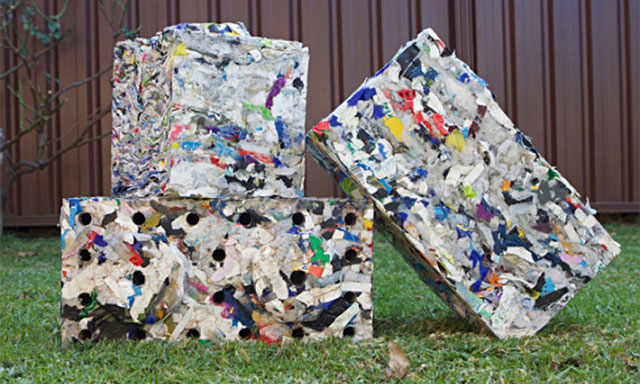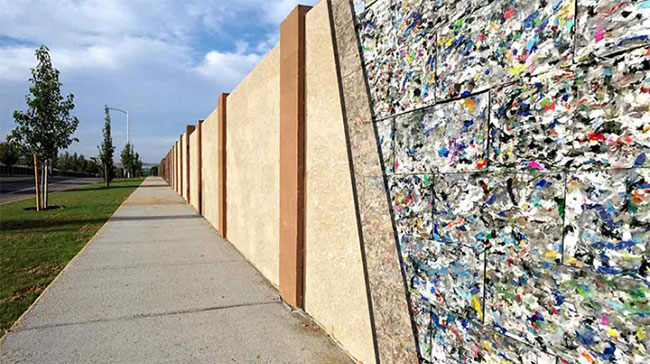Turn non-recyclable plastic waste into building blocks
The startup ByFusion produces ByBlock blocks from plastic waste that can be used to build fences, public yards, bus stops, to buildings.
Every year, Americans create about 42 million tons of single-use plastic, but only 9% of that is recycled. Part of that is because existing waste treatment facilities cannot keep up with the country's pace of plastic production. Another reason is simply because some plastics are not recyclable. Los Angeles-based startup ByFusion is on a mission to change that.
ByFusion uses compression combined with steam to shape all plastics, including those that are most difficult to recycle, into building blocks.
To create them, ByFusion uses patented machines called Blockers. Blocker can directly process plastic waste without sorting or cleaning, thereby saving considerable time and resources.

ByBlock building blocks are created by squeezing plastic waste.
The laminated product, ByBlock, comes in a standard size of 6 x 8 x 8 inches (0.4 x 0.2 x 0.2 m) in three variants: a model with locking pins; the second pattern is completely flat on the sides for easy attachment to other building materials; and the other is a combination of both. ByFusion is also working on developing smaller cubes.
Each ByBlock block is 10 pounds (4.5 kg) lighter and more durable than hollow cement blocks. They can be left outdoors, but because plastic is susceptible to sunlight, outdoor projects need to be covered with a clear coat of paint, or combined with another weatherproof material.

Part of the fence is built with ByBlock.
After years of research and development, ByFusion has built a full manufacturing facility in Los Angeles that can process 450 tons of plastic per year. Besides, the company is providing 12 other Blocker machines around the country.
To date, ByFusion has recycled 103 tons of plastic and has a goal of 100 million tons by 2030. The company hopes to install at least one Blocker machine in each city to collect and treat waste.
- Turning plastic into petroleum: 2-in-1 solution for plastic waste
- Turn plastic waste into a racing car
- America has found a way to turn plastic waste into cosmetics
- Big break: Recyclable plastic waste will be turned into super clean electricity
- Philippines built classrooms with recycled plastic bottles
- How long does it take for plastic waste to decompose?
- Scientists find the world's first reusable plastic
- Plastic bottles - gold mines in Taiwan
- Vietnam is the top 5 countries that discharge most plastic waste into the sea
- The technology turns plastic waste into edible fungus
- This simple tool can turn plastic bottles into ropes in just a few notes
- Singapore produces super light materials from plastic waste
 Is the magnetic North Pole shift dangerous to humanity?
Is the magnetic North Pole shift dangerous to humanity? Washington legalizes the recycling of human bodies into fertilizer
Washington legalizes the recycling of human bodies into fertilizer Lightning stone - the mysterious guest
Lightning stone - the mysterious guest Stunned by the mysterious sunset, strange appearance
Stunned by the mysterious sunset, strange appearance Even if humanity becomes extinct, these three traces of humanity will still exist almost forever!
Even if humanity becomes extinct, these three traces of humanity will still exist almost forever!  Microplastics found in more than 50% of clogged atherosclerotic plaques
Microplastics found in more than 50% of clogged atherosclerotic plaques  New Biodegradable Plastic Invention Leaves No Microplastics Behind
New Biodegradable Plastic Invention Leaves No Microplastics Behind  Mealworms - a promising solution to the threat of plastic waste
Mealworms - a promising solution to the threat of plastic waste  More than 6 million tons of plastic waste are floating in rivers, lakes and oceans.
More than 6 million tons of plastic waste are floating in rivers, lakes and oceans.  Turning plastic waste into a trendy trend
Turning plastic waste into a trendy trend 